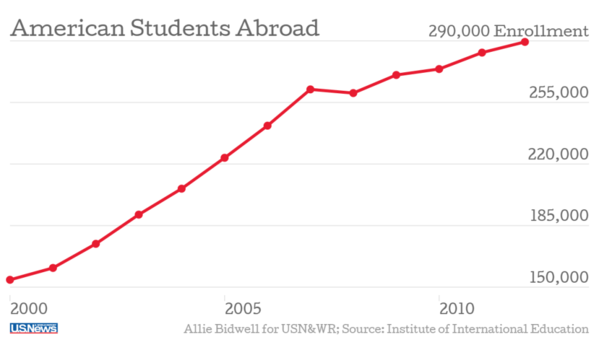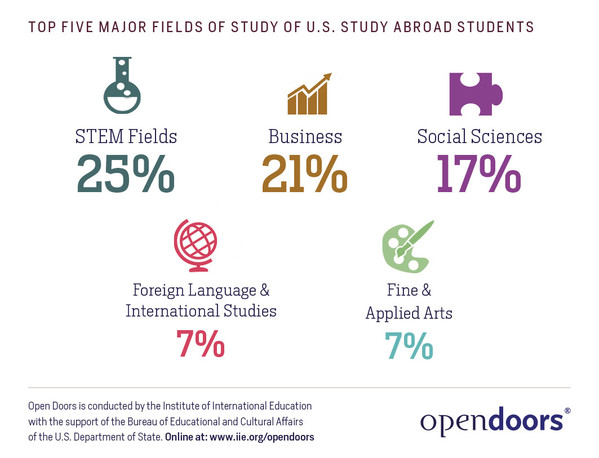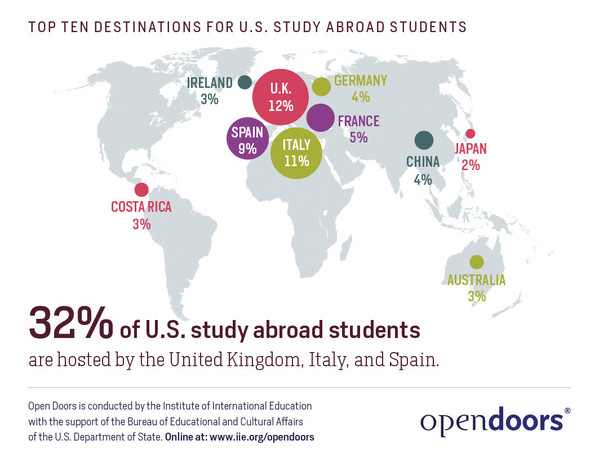Study Abroad Guide

- What is Study Abroad?
- Why Study Abroad?
- Study Abroad Benefits
- Reasons to Study Abroad
- Should I Study Abroad?
- Study Abroad Programs
- How to Plan for Study Abroad
- How to Pay for Study Abroad
Studying abroad is an experience that some college students choose to take advantage of at some point during their college career.
What is Study Abroad?
Studying abroad is the perfect way for students to travel the world and advance their academic career at the same time, all while earning school credit. When you study abroad you usually take anywhere from a semester to a full school year and spend it studying at another educational institution in another country. You will still technically be a student at your home university.
Why Study Abroad?
US students are now studying abroad at record levels as the number of students choosing to study abroad has nearly doubled since 2000.

There are many reasons why one would consider studying abroad. Sure, you might be looking for a specialized program at a foreign university because it will enhance your education, but studying abroad offers countless other reasons to break the routine of your life, ranging from learning a new language to developing a cross-cultural understanding to simply wanting an adventure overseas. Deciding why you want to go abroad will help you plan your perfect experience.
Maybe you want to improve your French by studying abroad in France, or get to know the Japanese culture by studying in Japan. Whatever the reason, knowing what you want to get out of your study abroad experience beforehand will lead to a successful and rewarding time abroad.
Study Abroad Benefits
Some students (and their parents) may be reluctant to do study abroad, however, there are many benefits of studying abroad. You should explore these advantages of studying abroad when making your decision to study abroad in a foreign country.
Studying abroad has its pros and cons. The main benefit of studying abroad is it gives you an opportunity to get a more diverse education. This qualification will be very valuable to your academic career. Being away from home to study abroad develops key virtues within a person, such as self-reliance, managing of personal finances, and building yourself into a stronger individual through life experiences.
Reasons to Study Abroad
Learn New Culture
One of the best perks of visiting a foreign country is experiencing and learning about the people and their culture. When you study abroad you have more time to immerse yourself into the culture, language and the people. It is an interesting and rich experience that you will appreciate for the rest of your life.
Resume Builder
Nothing looks better on your resume than a section that says you lived and studied abroad in a foreign country. You learned the language and you experienced life and education in another country. By putting this on your resume, you are showing that you can handle change and you can adapt to any experience thrown your way.
Studying abroad can be a great boost for your career, especially for those in the fields of social sciences, humanities, and business and management majors. These are some of the most common majors for studying abroad and are a perfect fit for those with any international-related career in mind (ex: International Business).

Learn a New Language
Once you arrive in the country where you will be studying abroad, you will be surprised how quick you pick up the language. Studies show that people can learn a foreign language through passive language learning by listening to daily conversation. You will come back to America as a bilingual student, which is a huge plus in the business world and makes you a more cultured individual.
Pro Tip: It can be very beneficial to start learning the basics of the new language of the country you choose to study abroad in. This way you won't feel so overwhelmed in the new environment.
Gain Independence
Studying in another country will force you out of your comfort zone. You will learn your way around new cities, meet new interesting people, and probably even take public transportation to get around. You will experience independence on a whole new level, which does not even compare to dorm living in the states. You will come back to America with a more confident attitude about yourself and your future.
Make New Friends
Chances are, if you study abroad you will be living in a dorm or apartment with other students or maybe a host family for a few months. No matter what the living arrangements, you will make new friends from another country. You will build lifetime friendships and multi-cultural connections.
Should I Study Abroad?
Studying abroad may seem like a great way to get freedom and other previously mentioned advantages, but it also has its own disadvantages. The main issue is that some students tend to suffer from homesickness. This is the major problem most students studying abroad experience. This is an issue, which when overcome, eases the quality of life of the student considerably. Studying abroad can be a difficult but rewarding process, just make sure the pros outweigh the cons when it comes to seeing if studying abroad is right for you.
There are many things students should consider when deciding whether or not to study abroad.
Concerns about Studying Abroad
- Family and Friends - This is the major factor which discourages many students from studying abroad and creates a major hindrance in the form of homesickness. It really depends upon the individual and whether or not they can handle being away from close friends and family.
- Finances - After you have decided whether or not you can handle living away from family and friends, the second most important factor that can influence a decision to study abroad is money. This factor does not necessarily hinder you from going abroad because study abroad student loans and scholarships can be obtained. Students in study abroad programs have access to special scholarships dedicated just for the purpose of studying abroad. Of course, money is always a concern when traveling/studying far from home. You will find that the cost of living is about the same, if not cheaper for most students. It all depends on the country you wish to study in.
- Quality of Education - Where you study is a very important factor when considering study abroad. The quality of education should be of equal or higher standard than you are currently getting.
How to Get Started with Study Abroad

Sometimes the process of planning to study abroad can seem overwhelming and too much of a hassle to be worth it. It’s easy to picture yourself sitting at a café in Paris or practicing your Mandarin with the locals in Taiwan, but once you actually decide that you want to go, everything gets complicated.
The best way to get started is to visit your school’s study abroad office. Here you’ll have the opportunity to talk to a study abroad advisor and ask questions about what study abroad programs are available and what is required to study abroad. The office will have materials on each program and can go over the process it takes to study abroad.
Study Abroad Programs
There are study abroad programs of all different types and sizes to fit your needs. There are also study abroad programs designed just for summer. A summer study abroad program gives you the joy of traveling in the summer, advancing your academic career in a new environment and a great experience.
The most popular study abroad programs are in Europe: United Kingdom, Italy, Spain, France and Germany, with United Kingdom being the most popular.

What kinds of Study Abroad programs are available?
There are multiple types of study abroad programs to choose from. Most students opt to study abroad during the school year, either for a semester or for the entire year, but you can also choose to go during the summer. Going during the summer is a great option for people who are worried about graduating on time. Check to see which programs offer you the ability to stay for a year after going for a semester—you will want to have the option!
After you figure out when to study abroad, think about whether you want to take classes in English or in another language. There are tons of programs for each; you can enroll in classes that are taught in English or in a language-intensive course where you will completely immerse yourself in a new language.
You can also decide whether you want to live with students in provided housing, live on your own, or live with a host family.
Check with your college, as they have info on a wide variety of study abroad programs. Also, be sure to meet with a study abroad advisor who can help you find a program and answer any questions you may have.
Planning for Study Abroad
As soon as you decide you want to study abroad, you need to sit down with a study abroad advisor and go over some specific items for how to study abroad to ensure you are following the proper study abroad requirements at your college.
- Do I qualify for study abroad?
There are often minimum GPA requirements for study abroad programs and sometimes minimum language foreign language proficiency requirements. In addition, work with your advisor to see if you have the right amount of units to go abroad; there might be a unit ceiling at your university.
- When to apply for study abroad.
Most students study abroad during their sophomore or junior year. In most cases, you will need to apply months in advance to study abroad. Figure out when the deadline to apply is and map out how you are going to complete your application. You might need to write an essay or include letters of reference, so leave yourself a substantial amount of time to get everything in on time.
- Can I study abroad and still graduate on time?
You will need to ensure you are able to take all of your required classes for your degree if you intend to graduate in four years. Speak with your advisor and make sure you are able to study abroad and still get in all your degree requirements so you can graduate on time.
- How do I pay for study abroad?
There are tons of ways to lessen the cost of studying abroad. The research can be overwhelming, but if you start early, it can save you a lot. Aid is available from a variety of sources.
How to Pay for Study Abroad
You can get financial help for study abroad from a number of sources:
- Financial Aid → If you choose a program endorsed by your school and are qualified to get government aid, you can get financial aid for your study abroad experience. Go to the website and look around.
- Government Loans → Check out federal loans: Stafford Loans and Parent PLUS loans.
- Scholarships → There are several scholarships that you may be eligible for: David L. Boren Undergraduate Scholarships for Study Abroad, a Benjamin A. Gilman International Scholarship. Plan ahead because you don’t want to miss the deadlines for these scholarships!
- Grants → Research to see if you are eligible for a Federal Pell Grant or the Federal Supplemental Education Opportunities Grant.
- Private funding → Look for private scholarships like the Freeman Awards. Companies like Go Overseas offer scholarships every year.
- Program discounts → Many study abroad programs like API and CIEE have discounts or scholarships available to students. When you choose a program, make sure that you check for these opportunities.
Studying abroad is an incredible opportunity that should not be passed up by college students. With experience from living and studying abroad you are improving yourself in more ways than you can imagine. You are gaining experience, learning the culture, and building friendships. It is all an experience that you would never regret and is an opportunity that should be taken advantage of. The bottom line for those considering studying abroad is to start planning early!
Why Study Abroad?
- Earn School Credit.
- Travel and see the world.
- The international experience will look good on your resume.
- Language and culture: Learn a second language.